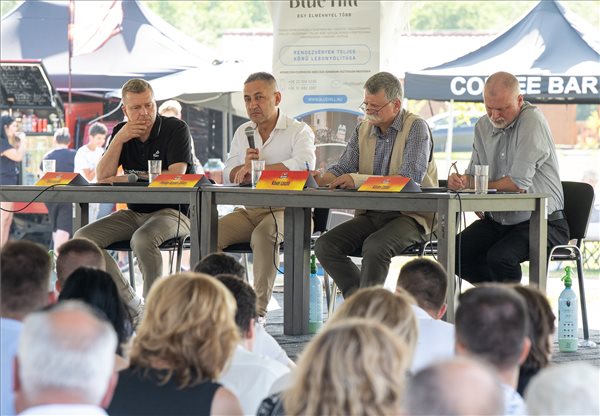
According to Zsolt Németh, the war must not be used as an excuse to restrict human and minority rights.Continue reading

“Questions about the implementation of mandatory migrant quotas have no answers, and this shows that they are really about weakening the European Union and throwing it into chaos,” said László Kövér, Speaker of the National Assembly, in Martovce (Martos, southwest Slovakia), where he participated in the opening forum of the Martovce Free University.
The Speaker of the National Assembly, who is the main patron of the Free University, spoke about the current problems facing Europe and the European Union, issues related to migration and migrant quotas, the consequences of the conflict in Ukraine, and other challenges of global significance.
He added that in recent years, the results of decades of latent processes, such as the economic crisis and migration, have come to the surface and have surpassed even the wildest nightmares.
Speaking about the decision of a quota system for the compulsory distribution of migrants, the speaker pointed out that there are no answers to the questions about its implementation, such as how the people to be resettled would be selected, how they would be kept in the country of destination, and what level of care they would receive.
It is clear that these questions are not answered, but nobody cares. However, then you have to ask what it is really all about. If the goal is not to destroy the EU – which I do not rule out – then the goal is at least to weaken the EU to the point of immeasurable and extreme chaos,”
emphasized Kövér.
In the context of the ongoing conflict in Ukraine, the he also spoke about the emigration from Ukraine, noting that Ukraine is facing a demographic catastrophe, with at least 10 million people having fled the country so far.
In response to a question on how to respond to current challenges, the Speaker of the National Assembly stressed that we are witnessing a process of disintegration in the world, a process leading to the total destruction of authority and culture, with the ultimate aim of dismantling human identity. He added that
the challenge today is therefore to rescue values, to rescue a state of “normality.”
The forum was also attended by Árpád János Potápi, Secretary of State for National Policy of the Prime Minister’s Office, who gave an overview of recent events in the Carpathian Basin from the perspective of national policy. He said that the successes of national policy so far had been achieved jointly, and the goals had been set, and now, with these results in mind, a positive vision of the future must be presented to Hungarians and young people.
Speaking about the difficulties of national policy, he cited the example of Transcarpathia in the wake of the war in Ukraine and the Hungarians living there, tens of thousands of whom now have to live in other countries. He pointed out that Hungary has so far helped some one and a half million people who have fled Ukraine, yet when people say in a European forum that the rights taken away from Hungarians in Transcarpathia should be returned, they are immediately labelled pro-Russian, and “Putin’s henchmen.”
It is not the task of the 150,000 Hungarians of Transcarpathia to help decide which Slavic country should win this war,”
Potápi stressed.
The State Secretary said that due to the war situation and the consequences of the sanctions response, the country’s economic opportunities are not what they were before 2021, but there can be no backing down from the objectives of national policy, because
Hungarian people must be kept in their homeland and the Hungarian character of the Carpathian Basin must be preserved.
Speaking about the results of the 2020 census in Slovakia, Krisztián Forró, chairman of the United Hungarian Party of Felvidék (formerly part of Hungary, now Slovakia), said that they had become a little more optimistic because the numbers had not decreased as much as they had feared. He added that for this he thanked the Hungarian government and its extensive assistance in keeping Hungarian values alive in the region.
The party leader said that the problems of Hungarians in Felvidék should be addressed by the Slovak government, however, this is not happening, as shown by the fact that the Hungarian-inhabited areas have become a remote region. Most of the districts without any motorways or expressways are in southern and eastern Slovakia, and the districts with the highest unemployment are also there. Referring to the early parliamentary elections in Slovakia scheduled for September, Forró said that Hungarians living there must realize that there is no alternative to gaining parliamentary representation.
Via MTI, Featured photo via MTI/Csaba Krizsán